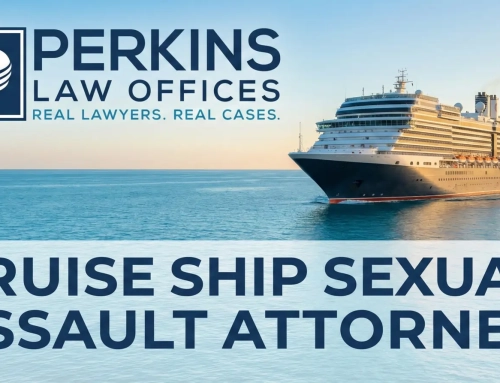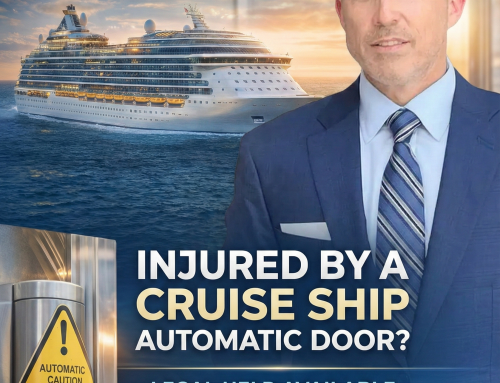What Law Applies on Cruise Ships? Understanding Maritime Jurisdiction and Your Legal Rights at Sea
By Perkins Law Offices – Miami Cruise Ship Injury Lawyers
Navigating the Legal Waters: What Law Applies on Cruise Ships?
When an incident happens aboard a cruise ship—whether it’s a personal injury, crime, or contractual dispute—passengers often find themselves asking: What law applies on cruise ships? The answer is far from simple. Unlike accidents that occur on land, cruise ship incidents fall under a distinct and complex legal framework shaped by maritime law, international maritime regulations, and contractual obligations embedded in the fine print of cruise tickets.
At Perkins Law Offices, a Miami-based law firm with extensive experience in cruise ship injury law, we understand the confusion and legal hurdles passengers face. If you’re researching this topic, chances are you’re considering legal action and asking questions like:
Can I sue a cruise line for injury or negligence?
Where do I file a claim if something happened in international waters?
What legal rights do I have as a cruise passenger?
This page is designed to provide a clear, comprehensive explanation of the laws that govern life and liability at sea, including how and where victims of cruise-related incidents can seek justice.
The Legal Framework That Governs Cruise Ships
Understanding what law applies on cruise ships requires an examination of several interrelated legal systems. These laws vary depending on the location of the incident, the ship’s country of registration, and the contractual terms of your cruise ticket.

What Law applies on cruise ships?
Maritime Law and Admiralty Law: The Foundation
At the heart of most legal matters involving cruise ships is maritime law, also known as admiralty law. This specialized area of law governs navigation and commerce on oceans and other navigable waters.
Key elements of maritime law that affect passengers include:
Duty of Care: Cruise lines owe a duty of reasonable care to passengers. This standard was established by U.S. courts and applies to ships that depart from U.S. ports, like Miami.
Liability for Negligence: If a cruise line fails to provide a safe environment, and you are injured as a result, they may be held liable under maritime principles.
Statute of Limitations: Most cruise contracts require passengers to file injury claims within one year, which is significantly shorter than standard personal injury statutes. They also usually mandate written notice of the injury within six months.
International Maritime Law and Flags of Convenience
Most cruise ships are registered in foreign countries like Panama, the Bahamas, or Liberia—a practice known as “flag of convenience.” This means the ship technically falls under the laws of its flag state.
However, U.S. law often still applies—particularly if:
The cruise departs from a U.S. port.
The ticket contract specifies that legal disputes must be filed in a U.S. court (often Federal Court in Miami).
The cruise line has its corporate headquarters or primary business in the U.S.
This hybrid jurisdiction creates complexity, but also opportunity: many cruise passengers still have valid claims under U.S. maritime law, even if the ship is flagged elsewhere.
H2: Where Do You File a Cruise Ship Lawsuit?
Most major cruise lines—Carnival, Royal Caribbean, Norwegian, and others—include forum selection clauses in their ticket contracts. These clauses often require that lawsuits be filed in a specific jurisdiction, usually Miami, Florida, regardless of where the incident occurred.
Perkins Law Offices, located in the heart of Miami, regularly handles such claims. We have deep experience navigating the procedural and jurisdictional hurdles these cases present.
“Cruise lines are protected by carefully crafted contracts and layers of international law. You need a law firm that knows how to hold them accountable in court.”
— Alex Perkins, Esq., Founding Attorney, Perkins Law Offices
Common Legal Scenarios on Cruise Ships
Understanding what law applies on cruise ships becomes particularly important in the following situations:
Cruise Ship Injuries
Slip and falls, trip hazards, pool accidents, medical negligence, and shore excursion mishaps are among the most common injury cases we handle. These fall under cruise injury law, and must often be filed under maritime legal standards with strict notice and filing deadlines.
Cruise Ship Crime Law
Incidents involving assault, theft, or sexual assault aboard cruise ships introduce another layer of legal complexity. Cruise lines are required under the Cruise Vessel Security and Safety Act (CVSSA) to report certain crimes and to meet security standards—but enforcement is weak. Victims often require experienced representation to pursue civil claims for negligence or inadequate security.
Medical Malpractice at Sea
Though cruise lines often claim their onboard medical staff are “independent contractors,” courts have allowed lawsuits where the ship’s management or procedures contribute to medical errors. Knowing which laws apply in these situations requires legal expertise and aggressive advocacy.
Real Case Example: Medical Negligence on a Caribbean Cruise
A recent client of Perkins Law Offices was a Florida resident who suffered a head injury after falling during rough seas. The onboard medical team failed to properly diagnose a traumatic brain injury. By the time the passenger received proper treatment back on shore, her condition had worsened significantly.
Despite the ship being registered in the Bahamas and the incident occurring in international waters, we successfully filed the claim in U.S. Federal Court in Miami, under U.S. maritime law, and obtained a substantial confidential settlement.
Your Rights as a Cruise Passenger
Passengers have legal protections, but many are unaware of their rights or miss critical deadlines. Here’s what you should know:
Cruise ship regulations require safe conditions aboard, including proper maintenance and adequate security.
Cruise passenger rights include receiving medical care, being informed of incidents, and not being subjected to negligence.
Legal rights at sea are not waived simply because the ship is in international waters.
What Should You Do if You Were Injured on a Cruise?
If you’re researching what law applies on cruise ships because you or a loved one suffered harm at sea, here are the steps you need to take immediately:
Report the incident in writing to the cruise line as soon as possible.
Request and keep copies of any incident reports or medical records.
Do not rely on cruise ship staff or insurance companies to explain your legal rights.
Consult with a maritime law attorney before your rights expire.
Time is critical. If your ticket requires a claim to be filed within 12 months, delay could mean losing your right to sue altogether.
Frequently Asked Questions
Q1: Can I sue a cruise line if I got hurt on board?
Yes. Under maritime law, cruise lines can be held liable for injuries resulting from unsafe conditions, crew negligence, or inadequate medical care. Most lawsuits must be filed in a specific court, often Miami.
Q2: What happens if my injury occurred in international waters?
International waters law still allows passengers to sue under U.S. maritime law if the cruise line has significant ties to the U.S. or your ticket specifies a U.S. jurisdiction.
Q3: Is there a time limit for filing a lawsuit against a cruise line?
Yes. Most cruise lines enforce a one-year statute of limitations for injury claims and require notice within six months. Missing these deadlines can bar your case entirely.
Q4: Who investigates crimes on cruise ships?
Depending on the ship’s flag state and location at the time of the incident, investigations may involve foreign authorities, FBI, or Coast Guard. However, criminal accountability at sea is often limited—civil lawsuits are often the only path to justice.
Q5: Why is Miami the place to sue most cruise lines?
Because many cruise lines are headquartered in South Florida and include Miami forum selection clauses in their contracts, U.S. Federal Court in Miami is the most common venue for cruise ship lawsuits.
Contact a Trusted Cruise Ship Lawyer in Miami
Cruise lines are billion-dollar corporations with vast legal teams working to protect their interests. Don’t face them alone.
Perkins Law Offices is a nationally recognized firm based in Miami, the cruise capital of the world. We have secured significant recoveries for passengers injured aboard major cruise lines and understand the intricate web of ship law, ocean travel law, and international maritime legal issues.
If you’re asking what law applies on cruise ships, chances are you’re also asking whether you have a case. Let us answer that—free of charge.
Call Perkins Law Offices today at (305) 741-2115 or contact us online for a confidential case evaluation.




